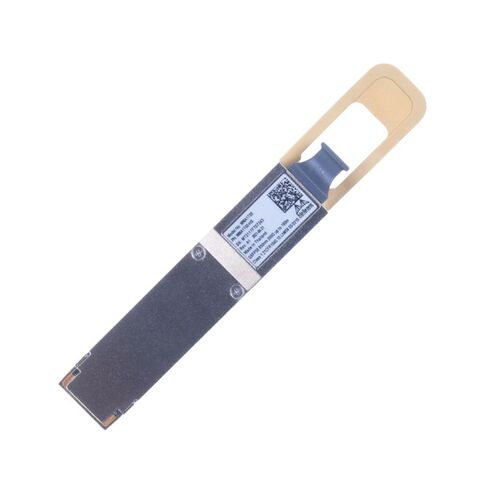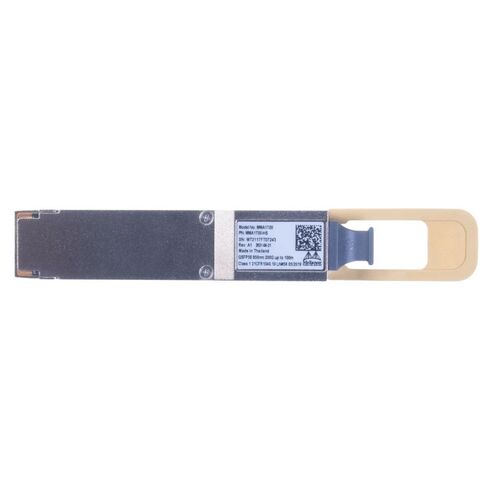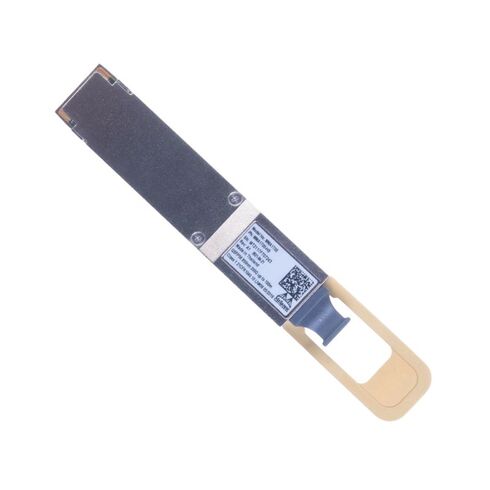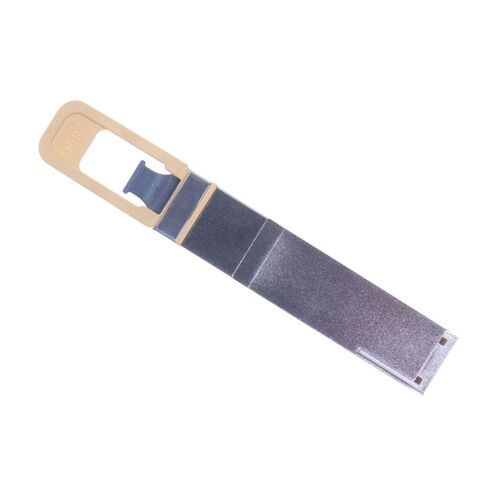MMA1T00-HSNvidia QSFP56 Mpo Optical Transceiver Hdr 850nm Sr4 Up To 100m
- — Free Ground Shipping
- — Min. 6-month Replacement Warranty
- — Genuine/Authentic Products
- — Easy Return and Exchange
- — Different Payment Methods
- — Best Price
- — We Guarantee Price Matching
- — Tax-Exempt Facilities
- — 24/7 Live Chat, Phone Support
- — Visa, MasterCard, Discover, and Amex
- — JCB, Diners Club, UnionPay
- — PayPal, ACH/Bank Transfer (11% Off)
- — Apple Pay, Amazon Pay, Google Pay
- — Buy Now, Pay Later - Affirm, Afterpay
- — GOV/EDU/Institutions PO's Accepted
- — Invoices
- — Deliver Anywhere
- — Express Delivery in the USA and Worldwide
- — Ship to -APO -FPO
- — For USA - Free Ground Shipping
- — Worldwide - from $30
Product Details
Overview of Nvidia MMA1T00-HS Optical Transceiver
The Nvidia MMA1T00-HS is a state-of-the-art optical transceiver designed for high-speed data transmission. This Hdr Qsfp56 model operates at a wavelength of 850nm, making it suitable for short-range applications.
Main Features
- Manufacturer: Nvidia
- Model Number: MMA1T00-HS
- Maximum Data Rate: 200 Gb/s
- Distance Capabilities:
- Up to 100 meters on OM4 multimode fiber
- Up to 70 meters on OM3 multimode fiber
- Modulation Technique: 4x 50Gb/s PAM4
Performance Specifications
- Programmable Rx Output: Adjustable amplitude and emphasis
- Adaptive Tx Input Equalizer: Optimizes signal quality
- Compliances:
- SFF-8665 compliant QSFP56 port
- SFF-8636 DDM compliant
- Power Requirements:
- Single 3.3V power supply
- Power dissipation of 4.5W
- Bit Error Rate: Better than 1E-15
- QSFP56 Power Class: Class 5
- Laser Safety: Class 1 compliance
- Hot Plug Support: Yes
- RoHS Compliance: Yes
Standards and Connectivity
- IEEE Compliance: IEEE 802.3 200GAUI-4 / 200GBASE-SR4
- Connector Type: MPO-12 UPC male receptacle
- Management Interface: SFF-8636 compliant I2C
Applications
The MMA1T00-HS transceiver is ideal for:
- Data center connectivity
- High-speed networking solutions
- Short-range optical communication
Wavelength: 850nm
The Nvidia MMA1T00-HS Optical Transceiver is equipped with a powerful feature known as the Wavelength. This feature operates at a wavelength of 850nm, providing users with enhanced performance and reliability in data transmission.
Benefits of 850nm Wavelength
The use of the 850nm wavelength offers several benefits that make it an essential feature for users:
1. Enhanced Data Transmission Speed
The 850nm wavelength enables high-speed data transmission, allowing users to transfer large volumes of data quickly and efficiently. This is particularly crucial in settings where real-time data processing and analysis are required, such as data centers, cloud computing environments, and high-performance computing applications.
2. Improved Signal Quality
By operating at the 850nm wavelength, the Nvidia MMA1T00-HS Optical Transceiver ensures improved signal quality. The shorter wavelength minimizes signal loss and distortion, resulting in clearer and more reliable data transmission. This is especially important in environments with high levels of electromagnetic interference (EMI) or long-distance transmissions.
3. Compatibility with Fiber Optic Cables
The 850nm wavelength is widely supported by various types of fiber optic cables, making the Nvidia MMA1T00-HS Optical Transceiver compatible with existing infrastructure. This compatibility allows for seamless integration into network setups without the need for extensive modifications or additional investments.
Importance of 850nm Wavelength
The 850nm wavelength holds significant importance for users due to the following reasons:
1. Flexibility in Network Design
With the Nvidia MMA1T00-HS Optical Transceiver's 850nm wavelength, users have the flexibility to design and configure their networks based on specific requirements. Whether it's short-range connections within a building or longer-distance connections across multiple locations, the 850nm wavelength provides the versatility needed for diverse network setups.
2. Scalability and Future-Proofing
By leveraging the 850nm wavelength, users can future-proof their network infrastructure. As technology advances and higher data transmission speeds become the norm, the 850nm wavelength ensures compatibility with future optical transceiver upgrades and enables seamless scalability without requiring a complete overhaul of the existing network.
3. Cost-Effectiveness
The use of the 850nm wavelength offers cost-effective solutions for users. As it is a widely adopted standard, fiber optic cables and other networking components supporting this wavelength are readily available in the market. This availability helps in reducing costs associated with network deployment and maintenance.
Reach: Up To 100m
The Nvidia MMA1T00-HS Optical Transceiver features an impressive reach capability of up to 100 meters. This extensive reach makes it an ideal choice for both short-range and medium-range data transmission applications.
Benefits of Up To 100m Reach
The extended reach capability of up to 100 meters offers several advantages to users:
1. Versatile Deployment Options
The Nvidia MMA1T00-HS Optical Transceiver's 100m reach enables versatile deployment options within various networking environments. Whether it's connecting devices within a single room or extending connections across different floors or buildings, the 100m reach ensures flexibility in network design and eliminates distance-related constraints.
2. Simplified Network Infrastructure
With its extended reach, the optical transceiver minimizes the need for additional networking equipment, such as repeaters or signal boosters. This simplification of the network infrastructure not only reduces costs but also enhances overall network reliability by eliminating potential points of failure and signal degradation.
3. Seamless Connectivity in Large-Scale Environments
In large-scale environments, such as data centers or enterprise networks, the 100m reach of the Nvidia MMA1T00-HS Optical Transceiver ensures seamless connectivity between various network components. This capability allows for efficient data transmission and communication across different sections of the network, ensuring smooth operations and optimal performance.
Importance of Up To 100m Reach
The up to 100m reach feature holds significant importance for users due to the following reasons:
1. Future-Proofing Network Infrastructure
The 100m reach provides users with a future-proof solution for their network infrastructure. As businesses and organizations expand or reconfigure their physical spaces, having the capability to extend network connections up to 100 meters ensures that networking requirements can be met without the need for significant infrastructure changes or additional investments.
2. Seamless Integration with Existing Networks
The Nvidia MMA1T00-HS Optical Transceiver's 100m reach seamlessly integrates with existing network setups. Whether users have already established fiber optic networks or are planning to upgrade from copper-based connections, the ability to extend connections up to 100 meters facilitates smooth integration without disrupting current operations.
3. High-Speed Data Transmission
The 100m reach, combined with the optical transceiver's advanced technology, allows for high-speed data transmission over extended distances. This is particularly advantageous in scenarios where large volumes of data need to be transmitted quickly, such as multimedia streaming, video conferencing, or data backups.
Interface: QSFP56 Mpo
The Nvidia MMA1T00-HS Optical Transceiver features an interface known as QSFP56 Mpo, which stands for Quad Small Form-factor Pluggable 56 Multi-fiber Push-On. This interface offers users a highly efficient and reliable method for connecting the optical transceiver to compatible devices or network infrastructure.
Benefits of QSFP56 Mpo Interface
The QSFP56 Mpo interface provides several benefits to users:
1. High-Density Connectivity
The QSFP56 Mpo interface allows for high-density connectivity, enabling multiple fiber connections within a single compact module. This high-density capability saves valuable space in networking equipment, such as switches or routers, while providing a scalable solution for accommodating future expansion requirements.
2. Simplified Installation and Maintenance
The use of the QSFP56 Mpo interface simplifies installation and maintenance processes. The interface features a push-on mechanism, allowing for quick and effortless connection of the optical transceiver to compatible devices. Additionally, the interface's design minimizes the risk of signal loss or misalignment during installation or maintenance activities.
3. Interoperability with Existing Infrastructure
The Nvidia MMA1T00-HS Optical Transceiver's QSFP56 Mpo interface ensures interoperability with existing network infrastructure. This compatibility allows users to seamlessly integrate the optical transceiver into their current setups without requiring extensive modifications or replacement of networking components.
Importance of QSFP56 Mpo Interface
The QSFP56 Mpo interface holds significant importance for users due to the following reasons:
1. Scalability and Future-Proofing
The QSFP56 Mpo interface offers scalability and future-proofing capabilities. The high-density connectivity it provides allows for easy integration of additional optical transceivers or networking components as network requirements grow. This scalability ensures that users can expand their network infrastructure without facing limitations imposed by the interface's capacity.
2. Industry-Standard Interface
The QSFP56 Mpo interface is an industry-standard interface, widely adopted by various manufacturers and networking solution providers. This standardization ensures compatibility with a broad range of devices and equipment, making the Nvidia MMA1T00-HS Optical Transceiver a versatile choice for different networking environments.
3. Enhanced Reliability and Performance
The QSFP56 Mpo interface offers enhanced reliability and performance compared to traditional connection methods. The interface's design minimizes signal loss, crosstalk, and other potential performance issues, ensuring stable and high-quality data transmission. This reliability is particularly crucial in demanding applications where uninterrupted connectivity and minimal downtime are paramount.
Features: HDR, SR4
The Nvidia MMA1T00-HS Optical Transceiver boasts two noteworthy features: HDR (High Dynamic Range) and SR4 (Short Reach 4). These features contribute to the overall performance, efficiency, and versatility of the optical transceiver in various networking applications.
Benefits of HDR and SR4 Features
The HDR and SR4 features offer several benefits to users:
1. Extended Transmission Distance
The SR4 feature enables short reach transmission of up to 100 meters, making it suitable for connecting devices within close proximity. This extended transmission distance enhances flexibility in network design and facilitates easy connectivity between different network components without the need for additional equipment.
2. High-Speed Data Transmission
The HDR feature ensures high-speed data transmission, enabling users to transfer large volumes of data quickly and efficiently. This high-speed capability is particularly advantageous in bandwidth-intensive applications, such as video streaming, cloud computing, and data-intensive analytics.
3. Compatibility with Existing Infrastructure
The HDR and SR4 features are compatible with existing network infrastructure, allowing for seamless integration without requiring extensive modifications or replacement of networking components. This compatibility ensures a cost-effective solution for users, as they can leverage their current infrastructure while benefiting from the enhanced performance provided by these features.
Importance of HDR and SR4 Features
The HDR and SR4 features hold significant importance for users due to the following reasons:
1. Adaptability to Diverse Networking Needs
The combination of HDR and SR4 features enables the Nvidia MMA1T00-HS Optical Transceiver to adapt to diverse networking needs. Whether it's short-range connections within a single room or longer-distance connections across multiple locations, these features provide the flexibility required to cater to various network setups and applications.
2. Future-Proofing Network Infrastructure
The HDR and SR4 features future-proof network infrastructure by ensuring compatibility with evolving technology standards. As higher data transmission speeds become more prevalent, these features enable seamless integration with future optical transceiver upgrades, eliminating the need for complete network overhauls and minimizing disruptions to operations.
3. Enhanced Network Performance and Reliability
By leveraging the HDR and SR4 features, users can experience enhanced network performance and reliability. The high-speed data transmission capabilities provided by HDR ensure efficient communication between network components, while the extended transmission distance of SR4 facilitates seamless connectivity within a short reach environment. These features contribute to improved overall network performance and minimize the risk of data loss or degradation.













